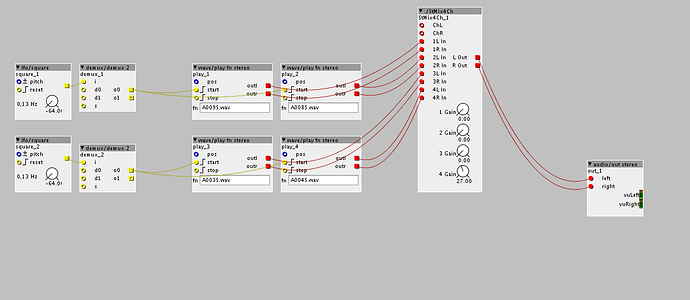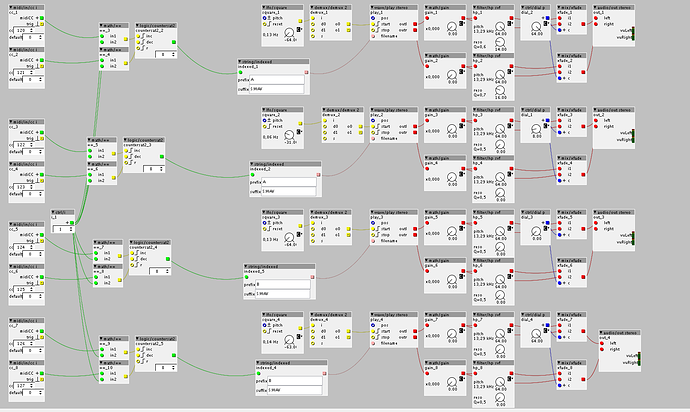Thanks Johannes,
this is my benchmark
Axoloti says: lseek1 OK...
Axoloti says: lseek2 OK...
Axoloti says: lseek3 OK...
Axoloti says: nstreams = 1,
Axoloti says: NBUFFERS = 128,
Axoloti says: BUFSIZE = 8192
Axoloti says: open : 399 ms
Axoloti says: write BW : 819 kB/s
Axoloti says: close : 7 ms
Axoloti says: open : 18 ms
Axoloti says: read BW : 4228 kB/s
Axoloti says: Open OK...
Axoloti says: lseek1 OK...
Axoloti says: lseek2 OK...
Axoloti says: lseek3 OK...
Axoloti says: Open OK...
Axoloti says: lseek1 OK...
Axoloti says: lseek2 OK...
Axoloti says: lseek3 OK...
Axoloti says: nstreams = 2,
Axoloti says: NBUFFERS = 128,
Axoloti says: BUFSIZE = 8192
Axoloti says: open : 933 ms
Axoloti says: write BW : 814 kB/s
Axoloti says: close : 11 ms
Axoloti says: open : 34 ms
Axoloti says: read BW : 3847 kB/s
Axoloti says: Open OK...
Axoloti says: lseek1 OK...
Axoloti says: lseek2 OK...
Axoloti says: lseek3 OK...
Axoloti says: nstreams = 1,
Axoloti says: NBUFFERS = 128,
Axoloti says: BUFSIZE = 4096
Axoloti says: open : 1294 ms
Axoloti says: write BW : 1368 kB/s
Axoloti says: close : 7 ms
Axoloti says: open : 19 ms
Axoloti says: read BW : 2912 kB/s
Axoloti says: Open OK...
Axoloti says: lseek1 OK...
Axoloti says: lseek2 OK...
Axoloti says: lseek3 OK...
Axoloti says: Open OK...
Axoloti says: lseek1 OK...
Axoloti says: lseek2 OK...
Axoloti says: lseek3 OK...
Axoloti says: nstreams = 2,
Axoloti says: NBUFFERS = 128,
Axoloti says: BUFSIZE = 4096
Axoloti says: open : 1086 ms
Axoloti says: write BW : 1100 kB/s
Axoloti says: close : 15 ms
Axoloti says: open : 34 ms
Axoloti says: read BW : 2461 kB/s
Axoloti says: Open OK...
Axoloti says: lseek1 OK...
Axoloti says: lseek2 OK...
Axoloti says: lseek3 OK...
Axoloti says: nstreams = 1,
Axoloti says: NBUFFERS = 128,
Axoloti says: BUFSIZE = 2048
Axoloti says: open : 568 ms
Axoloti says: write BW : 777 kB/s
Axoloti says: close : 7 ms
Axoloti says: open : 18 ms
Axoloti says: read BW : 1542 kB/s
Axoloti says: Open OK...
Axoloti says: lseek1 OK...
Axoloti says: lseek2 OK...
Axoloti says: lseek3 OK...
Axoloti says: Open OK...
Axoloti says: lseek1 OK...
Axoloti says: lseek2 OK...
Axoloti says: lseek3 OK...
Axoloti says: nstreams = 2,
Axoloti says: NBUFFERS = 128,
Axoloti says: BUFSIZE = 2048
Axoloti says: open : 1088 ms
Axoloti says: write BW : 536 kB/s
Axoloti says: close : 11 ms
Axoloti says: open : 34 ms
Axoloti says: read BW : 1291 kB/s
Axoloti says: Open OK...
Axoloti says: lseek1 OK...
Axoloti says: lseek2 OK...
Axoloti says: lseek3 OK...
Axoloti says: nstreams = 1,
Axoloti says: NBUFFERS = 128,
Axoloti says: BUFSIZE = 1024
Axoloti says: open : 566 ms
Axoloti says: write BW : 121 kB/s
Axoloti says: close : 7 ms
Axoloti says: open : 19 ms
Axoloti says: read BW : 784 kB/s
Axoloti says: Open OK...
Axoloti says: lseek1 OK...
Axoloti says: lseek2 OK...
Axoloti says: lseek3 OK...
Axoloti says: Open OK...
Axoloti says: lseek1 OK...
Axoloti says: lseek2 OK...
Axoloti says: lseek3 OK...
Axoloti says: nstreams = 2,
Axoloti says: NBUFFERS = 128,
Axoloti says: BUFSIZE = 1024
Axoloti says: open : 1095 ms
Axoloti says: write BW : 272 kB/s
Axoloti says: close : 11 ms
Axoloti says: open : 34 ms
Axoloti says: read BW : 653 kB/s
Axoloti says: SDCard benchmark finished.


